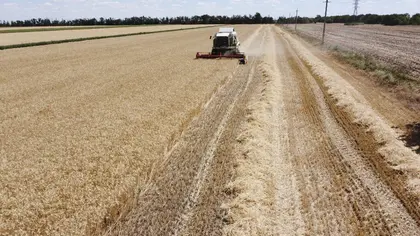In the hope of curbing a world-wide food crisis, Ukraine and Russia recently signed a grain deal in the midst of war between the two countries. The ships are sailing again, yet some Ukrainian farmers are still struggling to stay afloat – despite a plentiful harvest season.
Lanes upon lanes of sunflower fields shimmer and wheat fields glimmer under the golden summer sun. Welcome to the district of Maksymivka, typical of much of the countryside in eastern Ukraine.
JOIN US ON TELEGRAM
Follow our coverage of the war on the @Kyivpost_official.
Farmer Anatoly Ternov is busy harvesting his 1,700-hectare farm. His combine harvesters plough through the fields, reaping, threshing, gathering, and winnowing – collecting every single grain. However, the low hum of agricultural machinery is drowned out by the roar of distant shelling.
“You see the last tree on the horizon over there? That’s already Russia,” the 67-year-old points out – his land only 6 kilometers from the enemy. “We live in an active combat zone. The traders are afraid to come and collect the grain.”
Anatoly’s worries are not unfounded. On the worst day, his house was attacked by 40 grad rockets and up to 20 shots from long-range artillery, while the other side of the village was hit by 12 rockets. The shelling lasted for an hour. A neighboring farmer’s field caught fire from the shelling and charred land and burnt wheat remain. The idyllic village once had 20 working farms, but now only four are standing. Anatoly’s farm is one of them.

ISW Russian Offensive Campaign Assessment, January 25, 2025
Despite having spent blood, sweat and tears working the land, rewarding him with a total of 5,000 tons of grain, including wheat, soya, sunflower seeds and more, Anatoly is struggling to find a way to turn the golden grain into profit. He has two options including: i) renting a truck and driving out the grain (at a cost of 4,000-5,000 Hr. per ton from his own pocket); or ii) doing nothing and risking losing the grain if bombed again (at a cost of some 9 million Hr.
Anatoly is in a state of despair – emotions he has experienced for the first time in 25 years of being in business. “What other options do we have? If we abandon it, what should we do next?” Anatoly shrugs.
According to the Ukrainian Agribusiness Club (UCAB), Ukraine expects to reap 67 million tons of grain and oilseed this year, but domestic consumption can only cover 38 percent of this. Although the harvest is 39 percent lower than last year, the Russian blockade of Ukraine’s ports since the start of the war in February brought grain exports to a standstill and spurred a global food shortage. That was until late July, when Ukraine and Russia signed agreements with United Nations and Turkish officials on reopening Black Sea delivery routes, giving a glimmer of hope to the situation.
Oleksandr Tereshchenko
Farmer Oleksandr Tereshchenko, 51, lives and works in the district of Ohiivka in the Kharkiv region. He used to export all his grain to Europe and Asia, but internal logistical costs rose tenfold during the Black Sea blockade, exacerbated by increased diesel prices and inflation. Locally, the price of wheat locally has dropped more than two-fold, costing just £100 per ton (3,600 Hr.)
Oleksandr only has a year’s worth of savings left, which could leave him bankrupt if he cannot sell his stock of wheat. “I am not an IT company. I work in the agriculture sector. I can’t just pack up all my machinery, move to the west and re-open the business,” Oleksandr exclaims. “My business is tied to the land and to this region. And especially to the ground.”
The grain deal may be timely for some farmers, but it is no panacea. According to Roman Slaston, director general of UCAB, liberated territories such as those in the Kyiv, Chernihiv and Sumy regions now suffer from mines in the fields, making sowing impossible. And that’s not including the active combat zones, such as in the Donetsk, Luhansk, Zaporizhzhia, Kherson and Kharkiv regions.
Slaston predicts that some farmers could face a shortage of storage during the harvest in September and a decrease in yields in the next season.
You can also highlight the text and press Ctrl + Enter











